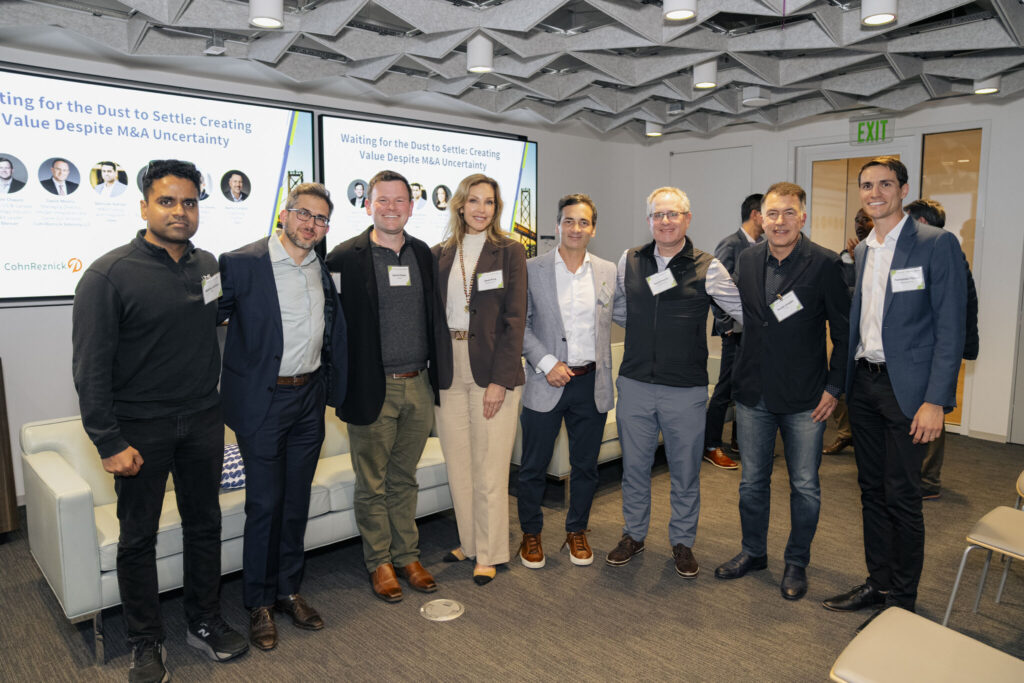The current tariff landscape has created market volatility similar to the early COVID-19 pandemic, one where it is difficult to forecast and plan. Amongst political shifts and economic headwinds, it is becoming clear that uncertainty is the new normal.
Despite volatility, the capital is still flowing, and deals are happening. This “new normal” means we will not return to previous market conditions. Therefore, expectations and tactics need to shift, especially as private equity firms show growing interest in AI technologies to streamline investment processes.
While global M&A markets did not deliver the return many dealmakers hoped for in 2024, a McKinsey report anticipated that “a strong upward pull” would lead to a “possibly sharply improved global M&A returns in 2025.” Yet, the rise of unpredictable trade policies has lowered these expectations, according to Pitchbook Report.
In the face of this uncertainty, this month in San Francisco, Making Sense LLC, CohnReznick, and Mercer hosted the event “Waiting for the Dust to Settle: Creating Value Despite M&A Uncertainty”—a conversation centered on how dealmakers are adapting to shifting market dynamics and building resilience in today’s M&A landscape.
Moderated by Mercer’s Aaron Chaum and CohnReznick’s David Morris, the panel explored the strategies for navigating challenges and seizing opportunities in the evolving landscape of mergers and acquisitions.
The panel featured notable figures in the M&A space, including Ignacio “Nacho” Giraldo, Operating Partner at TPG, Janel King, Director of Business Development at SRS Acquiom, Abhinav K Katiyar, M&A Director at Uber, Joshua Zatkin-Steres, Head of M&A Integration at Zuora.
The discussion focused on deal execution and integration, highlighting how there is no margin for error in times of unpredictable market conditions: plans must be clear, detailed, and executable.
Given this context, dedicating more time to due diligence becomes essential. Dealmakers are responding to these dynamics with more thoughtful evaluations and creative deal structures, such as the growing use of earn-outs to balance risk and reward.
Accelerating integrations is challenging. Some aspects require time and simply cannot be rushed. Overall, integration is a key value driver, and companies must prioritize it. Since employees tend to stay put in turbulent times, the stability can support integration efforts.
What stood out most in the discussion was how technology is becoming central to how decisions are made. According to a KPMG report, an average of 87% of organizations managed to utilize tech to increase profits in 2024, 25% more than the previous year, revealing the importance of leveraging new technologies for sustained growth.
While adoption of AI in the M&A process is still in its early stages, TPG launched an internal AI tool and is hiring a senior leader to lead AI efforts. For TPG, AI is a present reality, not a future maybe.
Other companies on the panel proposed different perspectives. For example, Uber has not yet applied AI systematically in the M&A process. At the same time, Zatkin-Steres at Zuora is cautious about heavy AI investment, believing tech is evolving too quickly to make major bets right now.
AI usage has remained limited to document review tools, with few broader applications to be seen so far. During the event’s opening remarks, Making Sense LLC CEO Cesar DOnofrio shared his perspective: “Within the private equity environment, there are detractors, and people quite reluctant to accept AI. Although it is a conservative environment, I think there will be possibilities for early adopters, and AI will become part of the investment thesis of certain companies.”
Regardless of the approach to AI in the M&A space, technology is central to decisions, specifically in market insecurity. Those in M&A and investment want to be ahead of the rest and become those who have already seen it coming. And through the correct partner that helps them be first in a slower, less innovative industry, they gain the edge to outperform competitors and reach new heights. Making Sense plays an important role in strengthening outcomes and enabling their partners not only to hit their goals but to set new ones, driving success today and into the future.

